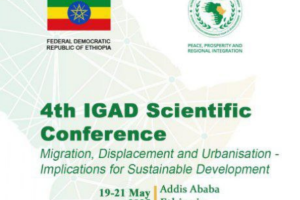
Ethiopia’s Transitional Justice Policy (TJP) is a critical policy that aims to address the injustices of the past and promote sustainable peace and stability. Needless to say, a collaborative effort among stakeholders is necessary to ensure that the policy is implemented effectively and transparently to achieve its objectives.
Ethiopia’s commitment to transitional justice is commendable, and its success requires a concerted effort from all stakeholders. The government, civil society organizations, and the international community must work together to promote a comprehensive and inclusive approach to transitional justice. Through this process, victims can find closure, perpetrators of past injustices can be held accountable, and the country can create a more inclusive and just society, promoting sustainable peace and stability.
Ethiopia’s TJP represents an important step towards healing the wounds of the past and rebuilding a society based on respect for human rights and the rule of law. The policy is designed to ensure accountability and transparency for past crimes and abuses, as well as to establish a durable foundation for the promotion of justice and reconciliation.
Ethiopia’s determination to promote transitional justice and other measures demonstrates its commitment towards overcoming its past injustices and building a better future for its citizens. It is an exciting time as the country progresses towards a more inclusive and just society, and the success of these efforts relies on the participation of all stakeholders, including the government, civil society organizations, and the international community.
This move is critical in promoting lasting peace and unity in the country. The adoption of such policies is a starting point in the journey towards addressing past wrongdoings committed against citizens. One of the key aspects of transitional justice policies is accountability on the grounds that it promotes justice and reconciliation creating a conducive environment for healing to take place. Holding those responsible accountable is important not only to promote justice, but also to prevent future occurrences of the same injustices.
The realization of Ethiopia’s commitment to transitional justice and other measures requires the participation of all stakeholders. It is essential to establish dialogue platforms that allow for free and open discussions among the different groups and communities. Through such dialog, stakeholders can identify the best approaches and healing mechanisms for addressing past injustices and promoting unity in the country.
Transitional justice policies go beyond holding perpetrators accountable. They also promote healing by providing a platform for victims to share their experiences. Additionally, accountability promotes transparency and strengthens the rule of law. It inspires confidence among citizens and fortifies the justice system fostering a sense of trust in the government’s ability to serve its citizens effectively.
Accountability is a fundamental aspect of these policies, promoting justice and reconciliation while also preventing future occurrences of the same injustices. These policies foster healing by providing a platform for victims to share their stories and begin to find closure, promoting transparency and strengthening the rule of law and fostering trust in the government’s ability to serve its citizens effectively.
By the same token, a collaborative effort is necessary to support Ethiopia’s TJP and create a comprehensive pathway towards justice and reconciliation. Stakeholders should work together to ensure the policy’s effective and transparent implementation to achieve its objectives which include addressing past injustices, promoting sustainable peace, building a democratic society, and fostering social cohesion.
A comprehensive pathway towards justice and reconciliation is critical for Ethiopia’s sustainable peace and stability. The pathway involves various components each working together to ensure the policy is comprehensive and addresses all grievances. These components include, but are not limited to, the establishment of truth-telling mechanisms, reparations, trials, institutional reforms, and other related aspects.
Another essential component of the TJP is transparency and accountability. The policy must be implemented transparently and accountably to ensure public trust and confidence. Education is another critical component of a comprehensive pathway towards justice and reconciliation. It is an essential tool towards promoting human rights, tolerance, and respect for diversity. It can play a crucial role in deconstructing stereotypes, promoting dialogue and creating a shared sense of responsibility towards sustainable peace and stability.
One essential component of a comprehensive pathway towards justice and reconciliation is the establishment of truth-telling mechanisms. Truth-telling mechanisms promote transparency, accountability, and reconciliation by gathering and publicizing testimonies of human rights violations. They help victims and survivors find closure and begin the healing process while promoting reconciliation in society.
The establishment of truth-telling mechanisms and other components of the TJP may need significant investment of time and resources. Therefore, stakeholders should work together to mobilize and prioritize these resources and ensure that the policy is effective. A comprehensive pathway towards justice and reconciliation also requires ensuring the components align with international human rights standards.
It is essential to maintain the victims’ well-being while ensuring that justice is served. Another important aspect of the comprehensive pathway towards justice and reconciliation is ensuring the policy’s sustainability to achieve its objectives. All stakeholders should work together to ensure that these components are effectively implemented to achieve the policy’s comprehensive and integral approach.
Ethiopia’s unequivocal dedication to pursuing transitional justice is a testament to its determination for redressing past wrongs. It also reflects the government’s goal of creating a just and equal society, which will, in turn, lead to a stable and prosperous future for the country. This has inspired hope, trust, and admiration from many people around the world who are looking for accountability and reparation for past atrocities, particularly in regions where impunity has reigned supreme.
Ethiopia’s commitment to transitional justice is a testament to the government’s determination to address past wrongs, promote a just and equal society, and strive for lasting peace and prosperity for all.
By embracing transitional justice, Ethiopia has inspired hope, trust, and admiration both within the country and globally, demonstrating that justice, equity, and compassion are values that must be upheld if we are to build a better world for ourselves and future generations.
Creating channels that encourage public participation in decision-making processes, especially relating to issues that concern the affected communities, is essential to promote accountability and transparency. Transparency guarantees that the government’s activities are free from manipulation, and accountability ensures that those responsible for past injustices are held accountable.
Ethiopian Civil Societies Organizations Council has urged Civil Society Organizations (CSOs) to actively engage in the transitional justice process. It is recalled that Zelalem Eshetu, ECSOC Legal and Policy Affairs Advisor recently told The Ethiopian Herald that, a draft transitional justice is a green light to redress human rights violations and atrocities occurred several times.
It would enable us to acknowledge and redress for massive human rights violations, to make accountable, reform and build democratic institutions, and prevent the recurrence of violations. The ECSOC consulted 200 to 300 CSOs in the process of collecting inputs for a draft transitional justice policy. The process is not a role of merely the government, but the role of non-state actors is great, too, specifically CSOs have a huge contribution to realizing the process.
“ECSOC held discussions with some 292 CSOs representatives on a policy draft and model options. As CSOs, we officially recommend Ethiopia to follow or implement holistic transitional justice approach for inclusive healing and redressing of atrocities including ensuring accountability, compensation, institutional reform, conditional apology and other schemes,” he added.
The Intergovernmental Authority on Development (IGAD) Peace and Security Division (PSD) hosted a consultative workshop, gathering experts and officials to deliberate on Ethiopia’s Transitional Justice Policy, according to information obtained from Ethiopian News Agency.
A two-day workshop from 8th-9th September 2023 was officially opened by Justice Minister of Ethiopia, Gedion Timothewos and Siraj Fegessa, director of IGAD Peace and Security Division
Speaking at the occasion, the director termed this as a collaborative effort that seeks to support Ethiopia’s Transitional Justice Policy, crafting a comprehensive path to justice and reconciliation.
Siraj also emphasized on the significance Ethiopia’s Transitional Justice Policy towards peace and reconciliation.
BY ADDISALEM MULAT
THE ETHIOPIAN HERALD TUESDAY 19 SEPTEMBER 2023




